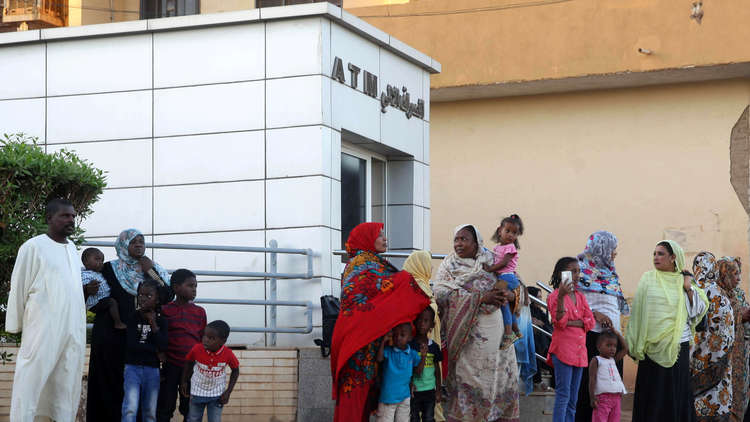Cash” Crisis.. Between Electronic Payment and Currency Printing

Sudan Events-Report – Rehab Abdullah
Citizens’ complaints increased about the existence of a cash liquidity crisis that worsened before Eid al-Adha, and many citizens were forced to conduct their commercial transactions through the “Bankak” application, even most of the purchase of sacrificial animals was done through the application’s transactions despite the prevailing understanding of the traditionalism of livestock owners and not dealing with banks or their applications, at a time when citizens failed to obtain “cash” from their balance in “Bankak”.
A request to the Central Bank
A number of bank managers acknowledged the existence of a severe crisis in providing cash liquidity, and revealed that a request was submitted to the Central Bank to increase liquidity to meet customer requests. At a time when some banks in the states acknowledged their inability to provide financing to farmers amid fears that failure to provide financing at the appropriate time would lead to the failure of the agricultural season.
Bank managers attributed the worsening crisis in banks before Eid al-Adha to the increase in withdrawals, and said that there are banks that have obligations to pay the salaries of pensioners and state employees, and they demanded the necessity of addressing the liquidity problem due to its negative impact on economic activity, as it has confused the markets because many sellers refuse to deal via electronic applications, and prefer to deal with “cash”, which forces the citizen to search for the nearest exchange shop to obtain “cash” after paying additional amounts to obtain cash amounting to 10%. Activating electronic transactions
Economic expert Dr. Mohamed Al-Nayer believes that the solutions to the cash liquidity crisis lie in activating electronic transactions and activating the Internet and communications networks so that electronic transfers are made easily and the citizen does not need “cash” basically.
He said in his interview to(Sudan Events)that this is one of the things that greatly reduces the pressure on cash liquidity and that all transactions are through banking applications and can greatly alleviate the pressure on “cash” and eliminate the need to print new currencies, in addition to the fact that it enables an increase in the level of electronic banking transactions, as it enables the recovery of a large part of the cash mass, more than 90% of which is with the public compared to less than 10% in the banking sector. Al-Nayer considered it a positive step for the economy and can support the economy.
Al-Nayer stressed that this requires a large program, including activating electronic transfers through banking applications, raising the level of awareness among citizens and improving the level of communication and Internet networks while working to implement
Financial inclusion, which is that a large percentage of the Sudanese people have bank accounts, even if they are electronic, and it is not required to go to the bank.
Current complications
However, the economic advisor Dr. Abu Bakr Al-Tijani, despite his acknowledgment that the solution usually facing the country’s cash liquidity problem is to adopt electronic payment methods for the seller and the buyer, he indicated in his interview with (Al-Ahdath) that the country’s current circumstances prevent this, and added, “Neither the seller owns a payment machine nor the buyer owns a payment card,” noting that the power outage and the Internet in many cities represent the biggest obstacle even if a payment machine and card are available.
Al-Tijani said that the second solution to address the cash liquidity crisis is for the Bank of Sudan to print money and provide banks with it to meet customer withdrawals, which saves cash in the economy, noting that countries usually do not resort to this solution due to the subsequent inflationary pressures resulting from the increase in the money supply in the economy.
Printing currency :
He said, “It seems that the Bank of Sudan CBS has no solution other than printing currency in light of the country’s current circumstances, provided that the Central Bank of Sudan (CBS)seeks to withdraw the increase in the money supply when the country’s conditions stabilize.”



